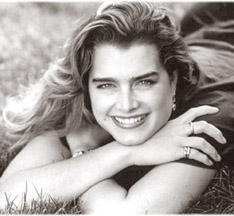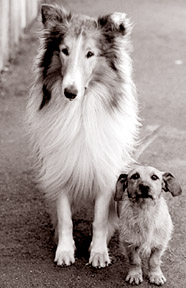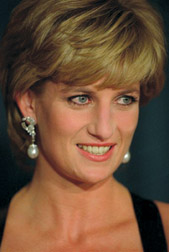|
observer |
|
|
|
|
|
OTHER LINKS |

|

|

|
EntertainmentTom apologizes to Brooke
"He [Cruise] came over to my house, and he gave me a heartfelt apology," the actress told Tonight host Jay Leno. "And through it all, I was so impressed with how heartfelt it was." Won over, Shields accepted the apology, she said. Through a spokesman, Cruise confirmed the olive branch. It was Cruise who fired the shot. During a discussion with 'Access Hollywood' in May 2005 about psychiatry and prescription drugs two non-favorites of the devout Scientologist the actor expressed doubt that therapy and the anti-depressant Paxil had helped Shields, as she had written in a book about overcoming postpartum depression following the birth of her first child. "Look at her life," Cruise charged while ostensibly promoting 'War of the Worlds'. "Here is a woman and I care about Brooke Shields because I think she is incredibly talented [but] you look at where has her career gone?" The implication: Since their work together in 1981's 'Endless Love', the prescription-drug-free Cruise had become A-list successful; the Paxil-popping Shields had become less so. (If only she'd taken vitamins...) Shields held fire until Cruise popped off again just weeks later during his infamous "you're glib" interview with 'Today Show's Matt Lauer. Cruise, who has never given birth, accused Shields, who has, of spreading "misinformation." "She doesn't understand the history of psychiatry," Cruise told Lauer. "She doesn't understand in the same way that you don't understand it, Matt." Shields responded with an op-ed piece in the 'New York Times' that slammed Cruise's "ridiculous rant." The aftermath: Since their tangling, Cruise has lost his pricey production deal with Paramount, alienated his female fan base or, so the theory of 'Mission: Impossible III' underwhelming box office goes and watched his likeability numbers fall 40 percent; Shields has bagged a recurring role on 'Nip/Tuck'. A recent quote from producer Kathleen Kennedy in the 'New York Daily News' suggested that Cruise "deeply regreted" his hectoring of Shields. But Kennedy later explained she didn't really know how Cruise felt. According to a statement from Cruise's camp to the Associated Press over the weekend, the actor feels exactly the same about Paxil. "It is true that his friendship with Ms. Shields has been mended," rep Arnold Robinson said. "He has not changed his position about antidepressants, which as evidenced by the black label warnings issued by the FDA on these types of drugs, are unhealthy." Still, Cruise has changed his position on the lecture circuit he's off it. "I didn't feel at any time that I had to defend myself, nor did I feel that he was trying to convince me of anything other than the fact that he was deeply sorry," Shields said on the 'Tonight Show'. Even before their settlement, Cruise, 44, and Shields, 41, were brought together, location-wise, in April when Cruise and life partner Katie Holmes welcomed daughter Suri down the hospital hall from Shields, who was giving birth to her and husband Chris Henchy's second daughter, Grier. In issuing the mea culpa, Cruise is borrowing a page from the script of Mel Gibson, who followed up his notorious f-king Jews" drunken-driving arrest of this past summer with a press-release apology to "everyone in the Jewish community," and reportedly with personal communications to individual members of the Jewish community. It is not believed Gibson has apologized to Shields. But if Cruise's Q ratings bump up... (E online)Salman Khan berates mediaTop Bollywood star Salman Khan has said he is "exploited" by the Indian media, and has blamed them for his "negative" off-screen portrayal. Interviewed by the BBC Asian Network, the actor said "controversy after controversy" had been covered. Khan said that while a section of the media wanted to write positive things about him, they were powerless. The 41-year-old, who has a reputation for reckless behaviour, was found guilty earlier this year of poaching. "There's a business section that wants to portray everything negatively so that they can sell magazines or get good top ratings on TV," Khan said of his "bad-boy" image. In June, the actor was charged with killing two black bucks, a protected antelope species, during a hunting trip in the state of Rajasthan in 1998. And in April the actor was sentenced to a five-year jail term - currently under appeal - for a separate hunting incident also in Rajasthan. He has always denied wrongdoing and is currently on bail while his appeal is being heard. Khan said that his conviction was wrong, and that the judge only sentenced him because he wanted to make an example out of him. "Apparently the judge said that openly," Khan said. "They wanted to set an example out of me... Who knew the black buck? I mean today because of me, people know there's an endangered species of deer called black buck, well it's actually an antelope." The poaching cases are not Salman Khan's first brush with the law. He is also facing trial in Mumbai (Bombay) in a 2002 hit-and-run case. One person was killed and three others injured when Khan allegedly drove into a group of homeless people sleeping on a pavement. Khan faces 10 charges, including causing death by negligent driving which carries two years in prison. He has pleaded not guilty on all counts. In his interview with the BBC, the Bollywood icon also slated the latest movie offering of his friend, fellow Bollywood actor Shah Rukh Khan. He said t hat "Kabhi Alvida Na Kehna" (Never Say Goodbye), was a "move away" from Shah Rukh Khan's typical roles and he had advised against it. "There's a lot of people out there who like him, and he moved away from his image, but it didn't work," Khan said. Salman Khan gave his interview after performing in a concert in the UK. (BBC NEWS)MOVIE REVIEW:'LASSIE'
Opening with a beautifully orchestrated sequence involving Lassie, a terrified fox and a mass of flapping laundry, the movie the 11th Lassie film, by the producers' count establishes its working-class turf immediately as miners and their wives confront a pack of blue-blooded hunters. The class conflict continues when the Duke of Rudling (a twinkling Peter O'Toole) buys Lassie from Sam Carraclough (John Lynch), an impoverished miner struggling to feed his stoic wife, Sarah and 9-year-old son, Joe (the adorable Jonathan Mason). For the remainder of the movie, Lassie will run, limp and crawl her way back to the family she loves, a journey that will require her to brave more than 500 miles of countryside and innumerable cameos by well-known British actors. You'll be pleased to know there are no wells. Elegantly directed by the veteran British filmmaker Charles Sturridge, best known for stiff-upper-lip fare like the television mini-series "Brideshead Revisited," "Lassie" approaches its classic tale with old-fashioned charm and not a trace of satire. As Lassie is transported to the Duke's summer estate in the Scottish Highlands, the movie's theme of forced separation is doubly underlined by Sam's heading off to war and the Duke's granddaughter, Cilla (Hester Odgers), being packed off to boarding school. This last occasions a lovely, tart scene in the school dormitory in which a dismayed Cilla is faced with row upon row of miserably numbered cots. "Just like the army," boasts the headmistress. Moving easily from the breathtaking shores of Loch Ness to the busy streets of Glasgow and the hills of Northumberland (the movie was filmed in Scotland, Ireland and the Isle of Man), "Lassie" balances cruelty and tenderness, pathos and humor without ever losing sight of its youngest audience member. And whether cringing before the Duke's vicious kennel man (Steve Pemberton) or performing alongside a traveling puppeteer (Peter Dinklage), this Lassie exhibits a repertory of facial expressions that would put Jim Carrey to shame. When little Joe in a scene that perfectly evokes the British school system's once-joyful embrace of corporal punishment gets whacked on the wrist by a ruler-happy teacher, the sight of a sorrowful Lassie licking the welts is enough to bring even the most flint-hearted viewers to their knees. Like the best kids' movies, "Lassie" is exquisitely tuned to the way a child sees the world. The journey from England to Scotland seems to encompass several time zones, and a glimpse of Nessie aligns our shaggy heroine with the creatures of Celtic folklore. And though adults may take issue with the film's ultimate capitulation to the power of patronage, tykes will just be happy that Lassie has come home once more to the multiplex where she belongs. "Lassie" is rated PG (Parental guidance suggested). It has mild violence, a bit of cursing and one dead doggie. Written and directed by Charles Sturridge, based on the book "Lassie Come-Home" by Eric Knight; director of photography, Howard Atherton; edited by Peter Coulson and Adam Green; production designer, J. P. Kelly; produced by Mr. Sturridge, Ed Guiney and Francesca Barra; released by Roadside Attractions and Samuel Goldwyn Films. Running time: 100 minutes. (New York Times)'Queen' to be released on Sep. 15With a command performance by Helen Mirren, 'The Queen' dares to break the biggest royal taboo, says Peter Whittle it takes her seriously. The woman; Elizabeth II, queen of all her realms and territories, one of the most famous faces in the world, butt of satirists and lightning rod for a nation in the middle of an identity crisis. The incident is fictional, of course, and, despite the presence of the iconically familiar hairdo, the features are unmistakably those of Helen Mirren. The scene is nevertheless extraordinarily powerful in its sheer audaciousness. It is as though we're being allowed to see something for the very first time, a glimpse into the inner life of somebody who, despite her having been in our lives for more than half a century as a formal, unchanging presence, we have assumed barely possessed one. It is one of the pivotal moments in The Queen, a film made by the team that produced 'The Deal', Channel 4's dramatisation of Tony Blair and Gordon Brown's Granita moment. Written by Peter Morgan, directed by Stephen Frears and premiered yesterday at the Venice film festival, it explores the relationship between the new prime minister, played once more by Michael Sheen, and the monarch during the week in 1997 when Diana died and much of the country appeared hysterical with grief. With the royal family holed up in Balmoral, unable or unwilling to understand such an unexpected national outpouring, the drama follows Blair's attempts to reconnect the Queen with her people at a time when the public mood seemed on the verge of turning dangerous. Two versions of the same country seemed to be on a collision course. "It's shocking to see her as a woman, isn't it?" says Frears. Yes and on the big screen, too, as opposed to the event-television drama slot usually lined up for a project such as this ("Well, she is the Queen," Frears explains). It is an account of those events that is, he says, sympathetic to her as a human being operating within the power dynamics of the time. So, alongside those solitary tears, we see her watching TV in bed with a hot-water bottle, being comforted and affectionately nicknamed "Cabbage" by her husband seeking reassurance from her mother and being irritated by the extravagance of her eldest son . It is almost surreal, the experience of seeing one so familiar in such unfamiliar settings and situations, rather as if she has suddenly walked in on one of your dreams a frequent occurrence, apparently, for many of her subjects. "You're dealing with the unconscious and the national unconscious," says Frears. "She's been in my life longer than any other person." (The Sunday Times - UK)Princess Diana film Oscar favourite in Venice'The Queen' by British director Stephen Frears, which offers an intimate portrayal of the aftermath of the death of Diana, the Princess of Wales, is generating early Oscar buzz at the 63rd Venice Film Festival.
'The Queen' is among the early favourites for the Golden Lion, the top prize at the Venice festival. Meanwhile, Helen Mirren's portrayal of the stoic monarch has garnered rave reviews from critics, and Mirren, Frears and other cast members received a 15-minute standing ovation after the premiere, according to news agency AFP. Success in Venice has been known to attract the attention of Academy Award voters. Frears, who directed the 2000 film *High Fidelity* starring John Cusack, has twice had a film nominated for the Golden Lion ? in 2000 for *Liam* and in 2002 for *Dirty Pretty Things*. His film *The* *Grifters*, starring Cusack as a small-time conman torn between his girlfriend and his mother (Anjelica Huston), earned Frears a nomination for the best-director Oscar in 1991. 'The Queen' deals with the conflict between the Royal Family and newly elected British Prime Minister Tony Blair, played by Michael Sheen, following Diana's death. While Queen Elizabeth seeks to protect the dignity of the monarchy by urging a private mourning for the woman who divorced her son, Prince Charles, in 1997, Blair argues that the appearance of inaction could permanently damage the monarchy. Caught in between is a nervous Charles, played by Alex Jennings, who struggles to persuade his mother that Diana's popularity requires her to go against protocol. 'The Queen''s scriptwriter, Peter Morgan, said the nine years that have elapsed since Diana's death were necessary to give the events proper perspective. "You needed the time for the spectacle of Diana's death to diminish," Morgan said. "You realize now that the Queen's memory eclipses that of Diana's. "The Queen has gone up to the pantheon of untouchable queens, while history now makes clear that Diana was a troubled figure and she wasn't the archangel or icon." Two other films depicting infamous calamities are also appearing in Venice. Oliver Stone's *World Trade Center*, currently being shown in U.S. theatres, tells the story of two New York City Port Authority officers trapped inside the twin towers after the Sept. 11, 2001, attacks by al-Qaeda militants. Spike Lee's documentary, *When the Levees Broke: A Requiem in Four Acts*, about the Hurricane Katrina disaster, debuted on HBO this week ? a year after Katrina devastated New Orleans. (The Associated Press) |

 Engaging in a war of words over postpartum depression, Tom Cruise and
Brooke Shields have made peace. The accord was announced by Shields last
week.
Engaging in a war of words over postpartum depression, Tom Cruise and
Brooke Shields have made peace. The accord was announced by Shields last
week.  Everything old is new again in "Lassie, the latest film about the
beloved pooch with the I. Q. of a grad student and the instincts of a
boomerang. Blissfully restored to the time period and location of Eric
Knight's 1940 novel, "Lassie Come-Home" originally filmed by MGM in 1943
the movie sets us down in a Yorkshire mining village with World War II
on the horizon and social inequality front and center.
Everything old is new again in "Lassie, the latest film about the
beloved pooch with the I. Q. of a grad student and the instincts of a
boomerang. Blissfully restored to the time period and location of Eric
Knight's 1940 novel, "Lassie Come-Home" originally filmed by MGM in 1943
the movie sets us down in a Yorkshire mining village with World War II
on the horizon and social inequality front and center.  The film, which premiered last week in Venice, mixes archival
television coverage with dramatizations of behind-the-scenes events as
it shows Queen Elizabeth struggling to determine the appropriate public
response to Diana's death in a car crash in Paris on Aug. 31, 1997.
The film, which premiered last week in Venice, mixes archival
television coverage with dramatizations of behind-the-scenes events as
it shows Queen Elizabeth struggling to determine the appropriate public
response to Diana's death in a car crash in Paris on Aug. 31, 1997. 







